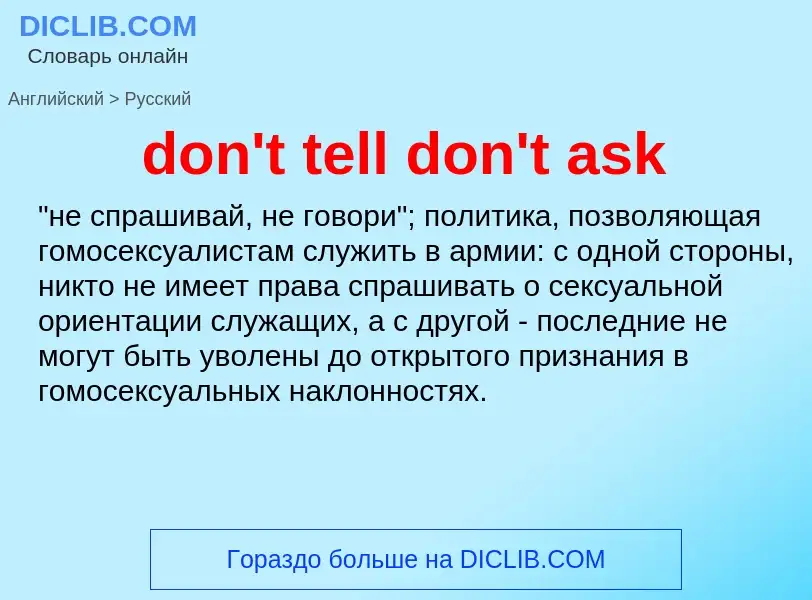Traducción y análisis de palabras por inteligencia artificial ChatGPT
En esta página puede obtener un análisis detallado de una palabra o frase, producido utilizando la mejor tecnología de inteligencia artificial hasta la fecha:
- cómo se usa la palabra
- frecuencia de uso
- se utiliza con más frecuencia en el habla oral o escrita
- opciones de traducción
- ejemplos de uso (varias frases con traducción)
- etimología
don't tell don't ask - traducción al ruso
[dʌznt]
сокращение
от does not
[dəunt]
существительное
[dəunt]
общая лексика
запрет
сокращение
от do not
глагол
общая лексика
не надо, полно, перестань(те)
сокращение
do not
Wikipedia

"Don't ask, don't tell" (DADT) was the official United States policy on military service of non-heterosexual people, instituted during the Clinton administration. The policy was issued under Department of Defense Directive 1304.26 on December 21, 1993, and was in effect from February 28, 1994, until September 20, 2011. The policy prohibited military personnel from discriminating against or harassing closeted homosexual or bisexual service members or applicants, while barring openly gay, lesbian, or bisexual persons from military service. This relaxation of legal restrictions on service by gays and lesbians in the armed forces was mandated by Public Law 103–160 (Title 10 of the United States Code §654), which was signed November 30, 1993. The policy prohibited people who "demonstrate a propensity or intent to engage in homosexual acts" from serving in the armed forces of the United States, because their presence "would create an unacceptable risk to the high standards of morale, good order and discipline, and unit cohesion that are the essence of military capability".
The act prohibited any non-heterosexual person from disclosing their sexual orientation or from speaking about any same-sex relationships, including marriages or other familial attributes, while serving in the United States armed forces. The act specified that service members who disclose that they are homosexual or engage in homosexual conduct should be separated (discharged) except when a service member's conduct was "for the purpose of avoiding or terminating military service" or when it "would not be in the best interest of the armed forces". Since DADT ended in 2011, persons who are openly homosexual and bisexual have been able to serve.
The "don't ask" section of the DADT policy specified that superiors should not initiate an investigation of a service member's orientation without witnessing disallowed behaviors. However, evidence of homosexual behavior deemed credible could be used to initiate an investigation. Unauthorized investigations and harassment of suspected servicemen and women led to an expansion of the policy to "don't ask, don't tell, don't pursue, don't harass".
Beginning in the early 2000s, several legal challenges to DADT were filed, and legislation to repeal DADT was enacted in December 2010, specifying that the policy would remain in place until the President, the Secretary of Defense, and the Chairman of the Joint Chiefs of Staff certified that repeal would not harm military readiness, followed by a 60-day waiting period. A July 6, 2011, ruling from a federal appeals court barred further enforcement of the U.S. military's ban on openly gay service members. President Barack Obama, Secretary of Defense Leon Panetta, and Chairman of the Joint Chiefs of Staff Admiral Mike Mullen sent that certification to Congress on July 22, 2011, which set the end of DADT to September 20, 2011.
Even with DADT repealed, the legal definition of marriage as being one man and one woman under the Defense of Marriage Act (DOMA) meant that, although same-sex partners could get married, their marriage was not recognized by the federal government. This barred partners from access to the same benefits afforded to heterosexual couples such as base access, health care, and United States military pay, including family separation allowance and Basic Allowance for Housing with dependents. The Department of Defense attempted to open some of the benefits that were not restricted by DOMA, but the Supreme Court decision in United States v. Windsor (2013) made these efforts unnecessary.


![[[US Navy]] LT [[Gary C. Ross]] marries Dan Swezy, becoming the first active member of the U.S. military to legally marry a same-sex partner. [[US Navy]] LT [[Gary C. Ross]] marries Dan Swezy, becoming the first active member of the U.S. military to legally marry a same-sex partner.](https://commons.wikimedia.org/wiki/Special:FilePath/DADT28.jpg?width=200)
![General [[Norton A. Schwartz]], chief of staff of the United States Air Force, testifies on the repeal of "Don't Ask, Don't Tell" before the Senate Armed Services Committee on December 3, 2010. General [[Norton A. Schwartz]], chief of staff of the United States Air Force, testifies on the repeal of "Don't Ask, Don't Tell" before the Senate Armed Services Committee on December 3, 2010.](https://commons.wikimedia.org/wiki/Special:FilePath/Defense.gov photo essay 101203-F-2270A-631.jpg?width=200)

![Soulforce]], a civil rights group. Soulforce]], a civil rights group.](https://commons.wikimedia.org/wiki/Special:FilePath/Everyone Joins the Soulforce Sit-In.jpeg?width=200)

![Obama signs the [[Don't Ask, Don't Tell Repeal Act of 2010]] Obama signs the [[Don't Ask, Don't Tell Repeal Act of 2010]]](https://commons.wikimedia.org/wiki/Special:FilePath/Obama signs DADT repeal.jpg?width=200)
 First Kiss 111221-N-JP983-008.jpg?width=200)
![Vic Guillory]], commander of U.S. Naval Forces Southern Command and U.S. 4th Fleet leads DADT repeal training for Tier 2 command leadership at Naval Station Mayport, March 17, 2011 Vic Guillory]], commander of U.S. Naval Forces Southern Command and U.S. 4th Fleet leads DADT repeal training for Tier 2 command leadership at Naval Station Mayport, March 17, 2011](https://commons.wikimedia.org/wiki/Special:FilePath/US Navy 110317-N-5469W-016 Rear Adm. Vic Guillory, commander of U.S. Naval Forces Southern Command and U.S. 4th Fleet, kicks off the Don't Ask, Don.jpg?width=200)
![Naval Special Warfare Command personnel watching Chief of Naval Operations Adm. [[Gary Roughead]] during DADT repeal training, April 6, 2011 Naval Special Warfare Command personnel watching Chief of Naval Operations Adm. [[Gary Roughead]] during DADT repeal training, April 6, 2011](https://commons.wikimedia.org/wiki/Special:FilePath/US Navy 110406-N-YS896-005 Naval Special Warfare Command personnel watch Chief of Naval Operations (CNO) Adm. Gary Roughead during Don't Ask, Don't.jpg?width=200)
 Repeal training for enlisted, officer and civilian staff of Nava.jpg?width=200)
